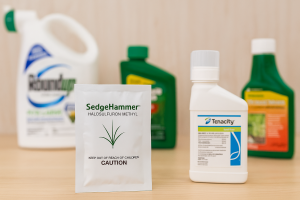Trying to figure out if Can You Mix Sedgehammer With Other Herbicides? Yes, you can mix Sedgehammer with other herbicides like Glyphosate, 2,4-D, and Quinclorac, but ensure compatibility and follow label instructions for effective and safe application.
Weed control is one of the most persistent challenges in maintaining healthy lawns, golf courses, commercial landscapes, and even crop fields. Sedgehammer, a widely respected post-emergent herbicide, is particularly effective at targeting nutsedge and other sedge weeds.
However, property managers, farmers, and homeowners often wonder — can you mix Sedgehammer with other herbicides to enhance results and expand weed control coverage?
This comprehensive guide explores the safety, benefits, and practical considerations of mixing Sedgehammer with other herbicides.
Let’s dive into the science, strategies, and real-world application of using Sedgehammer in mixed herbicide programs.
Can You Mix Sedgehammer With Other Herbicides?
What is Sedgehammer Herbicide?
Sedgehammer is a selective, post-emergent herbicide specifically designed to target nutsedge species, including yellow and purple nutsedge. It contains the active ingredient halosulfuron-methyl, which works by inhibiting acetolactate synthase (ALS), an enzyme vital to weed growth.
It is ideal for use on:
-
Residential lawns
-
Sports turf
-
Sod farms
-
Landscaped areas
-
Golf courses
-
Rights-of-way
Sedgehammer is known for its slow, systemic kill, meaning it is absorbed through the leaves and travels to the roots to kill the entire plant without harming desired grasses.
Is It Safe to Mix Sedgehammer With Other Herbicides?
Yes, Sedgehammer can be mixed with other herbicides, provided those products are compatible chemically and operationally. Many professionals mix Sedgehammer with broadleaf herbicides or grass control herbicides to widen the spectrum of control in a single application.
However, there are vital considerations:
-
Label restrictions: Always check the label for Sedgehammer and the other herbicide for mixing instructions.
-
Tank-mix compatibility: Some herbicides may antagonize or neutralize Sedgehammer’s effectiveness.
-
Surfactants: The right surfactant or adjuvant may be needed to ensure proper leaf penetration.
-
pH and water quality: Poor water quality or extreme pH levels can reduce efficacy.
-
Crop or turf safety: The combined effect of mixed herbicides may harm sensitive grass types.
Always conduct a jar test before spraying a full tank mix on your lawn or field.
Why Mix Sedgehammer With Other Herbicides?
Combining herbicides is a common practice for enhancing weed control. Here are key reasons to mix Sedgehammer with other herbicides:
1. Expanded Weed Spectrum
Sedgehammer targets sedges, but it doesn’t control many broadleaf weeds or annual grasses. By mixing it with a herbicide like 2,4-D, Dicamba, or Glyphosate, you can manage a broader range of unwanted plants in one pass.
2. Labor Efficiency
Instead of spraying multiple times with different products, a single application with a tank mix saves time, fuel, and labor.
3. Cost-Effectiveness
While Sedgehammer itself is highly effective, combining it with other affordable herbicides can deliver comprehensive results at a lower cost per acre.
4. Resistance Management
Using herbicides with different modes of action helps prevent weeds from developing resistance.
Best Herbicides to Mix With Sedgehammer
Whether you’re tackling yellow nutsedge, kyllinga, broadleaf weeds, or grassy intruders, this article will help you make informed decisions on mixing Sedgehammer with other herbicides.
We dive into compatibility, tank-mixing procedures, active ingredients, and which herbicides work best in combination with Sedgehammer.
Below are some herbicides that are commonly and effectively mixed with Sedgehammer:
1. 2,4-D
2,4-D is a selective broadleaf herbicide. It pairs well with Sedgehammer for lawns with sedges and dandelions or clover. It is compatible, but always use non-ionic surfactant.
2. Dicamba
Another broadleaf killer, Dicamba enhances control when used alongside Sedgehammer. It’s often found in “three-way” mixes like Trimec or SpeedZone.
3. Quinclorac
For post-emergent crabgrass control, Quinclorac and Sedgehammer form a powerful duo. Ideal for cool-season grasses.
4. Glyphosate (Roundup)
This is a non-selective herbicide. Mixing with Sedgehammer works for total vegetation kill in industrial or hardscape areas. Do not use this mix on lawns.
5. Atrazine
Used in warm-season grasses like St. Augustine or Centipede, Atrazine can be mixed for broader sedge and broadleaf control.
6. MSMA
In professional turf use, MSMA targets grassy weeds and sedges alike. It’s often paired with Sedgehammer, though MSMA has restricted usage in some states.
How to Properly Mix Sedgehammer With Other Herbicides
Step-by-Step Mixing Instructions:
-
Fill tank halfway with water.
-
Add Sedgehammer first — mix thoroughly.
-
Add other herbicide(s).
-
Add non-ionic surfactant (if not included in the herbicides).
-
Top off with remaining water.
-
Shake or agitate to mix completely.
-
Spray immediately.
Pro Tips:
-
Mix only what you’ll use in one day.
-
Clean your sprayer thoroughly after use.
-
Use flat-fan nozzles for even coverage.
-
Avoid spraying when temperatures are above 90°F or during drought stress.
Potential Risks of Mixing Sedgehammer
While mixing can be beneficial, it comes with some risks:
-
Reduced efficacy: Some herbicides may interfere with absorption or movement of Sedgehammer.
-
Crop or turf injury: Mixed formulas may become too harsh for some grass types.
-
Chemical incompatibility: Some mixtures can settle, clog nozzles, or become unstable.
-
Increased cost: Inappropriate mixes may lead to reapplication and added expenses.
Always read the product label and conduct a test spray before large-scale application.
Mixing Sedgehammer With Other Herbicides FAQs
1. Can I mix Sedgehammer with Roundup?
Yes, but only for non-selective situations. Roundup (Glyphosate) will kill everything it touches, including desirable grasses. Use this combo for spot treatments in gravel, driveways, or fence lines.
2. Can I mix Sedgehammer with Trimec?
Yes. Trimec contains 2,4-D, Dicamba, and MCPP. When mixed with Sedgehammer, it provides control for sedges and broadleaf weeds. Add a surfactant for maximum performance.
3. Is it safe to use Sedgehammer with surfactants?
Yes. In fact, Sedgehammer works best with a non-ionic surfactant (NIS). Surfactants improve absorption and overall weed control.
4. Can I mix Sedgehammer with pre-emergent herbicides?
Generally, it’s better to apply pre-emergents and post-emergents separately. However, some professionals use mixes like Sedgehammer + Prodiamine for overlapping weed control, provided both are compatible.
5. How long should I wait to apply a second herbicide after using Sedgehammer?
If not mixed together, wait 7–14 days before applying another herbicide. This allows Sedgehammer to move through the plant properly.
6. What grasses is Sedgehammer safe on?
Sedgehammer is safe on:
-
Bermuda
-
St. Augustine
-
Zoysia
-
Tall fescue
-
Kentucky bluegrass
-
Perennial ryegrass
Check the label for sensitive varieties.
7. Will mixing Sedgehammer with another herbicide affect rainfastness?
Possibly. Always check each product’s label. Most herbicides, including Sedgehammer, become rainfast in 4–6 hours, but this may vary based on mix and weather.
Conclusion
Mixing Sedgehammer with other herbicides is a smart and effective strategy for controlling a wide range of weeds in lawns, turf, and landscape settings.
Whether you’re combining it with 2,4-D for broadleaf control or Quinclorac for grassy weeds, the possibilities are vast — but require careful planning.
Always consider compatibility, grass safety, label instructions, and mixing procedures to achieve the best results.With the right mix, you can maximize weed control, reduce labor, and maintain a lush, healthy lawn year-round.
Recent Posts
Residual weed killers are essential tools in modern crop production because they provide long-lasting suppression of weeds before and after crop emergence. These products are designed to form a...
Weed control is one of the most critical components of successful highbush blueberry production, as weeds compete fiercely for water, nutrients, and light. Effective Highbush Blueberry weed treatment...